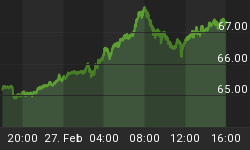For the past two weeks I've watched as countless articles have appeared on financial Internet sites, in newsletters, and even in mainstream newspapers about a soon-coming "crash" in U.S. property values. According to these sources, the crash is imminent and will reduce property and home values to a mere fraction of what they are now currently at multi-decade high levels. For a time, I too, was a believer in this imminent bear market in U.S. real estate. But I've now seen the error of my ways, and I now realize the outlook for real estate is still bullish and has more upside potential in the near-term than many people think.
As far as a crash is concerned, if there will be an imminent "crash" in real estate and REIT prices at all, it will most likely be to the upside. That's right, the major real estate indicators and REIT indices are looking bullish and are pointing to higher prices ahead. Let's take a look at these indicators for a close-up look at the message the market is sending.

First off, the message of the monthly chart in the prime U.S. REIT index (Morgan Stanley REIT index, symbol RMS) is bullish. The RMS has closed well above its 10-month moving average for the month of May and the 20/30-month MAs are still up and rising at a good rate of change. These directional drivers are about to catch up with the price line in RMS, which should result in an upward thrust in REIT values in coming weeks/months. Also, as you can see from the RMS monthly chart above, the stochastics indicator has reached a deeply oversold reading, which means the REITs are likely about to turn up in a big way this summer. Could the REITs be one of the big turnaround plays of the summer of 2004? I think so.
I've seen analysts refer to the violation of the 200-day moving average in RMS, but this isn't a good benchmark to use since this moving average reflects the 40-week cycle, and the 40-week cycle isn't the dominant interim cycle. Besides, RMS has since recovered back above the 200-day MA since falling below it earlier this spring and appears to have found its legs again. The ideal moving average series to use on a weekly basis is the 30/60-week MAs. Notice how the 60-week MA acted as a strong support during the recent decline in RMS and allowed the index to bounce upward once again and make a run on its 30-week MA. This is also near-term bullish.

How about the Accredited Home Lenders Holding Co. (LEND)? I've heard some analysts say this index is doomed to decline in coming weeks. I respectfully disagree. I see support near current levels and an upturn into summer. Crash now? Not likely.

In light of the recent interest rate upswing, I've been asked by several readers my take on the housing market in particular. Had my position on the housing changed, and how would the potential bullish scenario for stocks in the next few years ahead coincide with the real estate sector in general. Specifically, I was asked if I thought housing would top out ahead of the stock market or if both would eventually top out together later in this decade. While I'm no authority on real estate, based on my research of the long-term patterns in the real estate equities, I'd say that the real estate bull market will top out in conjunction with the broad stock market later this decade as we head closer to the K-wave bottom.
What about Fannie Mae? On the front cover of Barron's a few weeks ago, there was a drawing of a lady sweeping dirt under a carpet with the headline, "The Dirt on Fannie Mae: How accounting ploys at the mortgage giant, while legal, inflated profits and executive pay." This is a classic headline of the type normally seen at bottoms, viz., corporate scandals. This shows us that FNM is by no means "doomed" in the near-term, as some analysts have suggested.
In fact, from a fundamental standpoint (and as quasi federal agencies go), Fannie is well run by a solid management and in my opinion is being unfairly targeted by a bevy of analysts and federal officials who have an agenda that doesn't jibe with the current success of FNM and the bullish home lending market in general. There are those who actually WANT to see a real estate crash transpire so they can profit thereby. Hence, the attacks on FNM, FRE, et al. >From a chart standpoint, I see FNM and FRE in particular doing well in the near-term. Both stocks are trying to confirm a bottom after the recent decline and recovery rallies in both stocks should be evident in coming weeks.
A final point: if you look at the long-term graph of the Morgan Stanley REIT index (RMS) you will see a potential Elliott Wave labeling of a classic 5-wave advance currently underway. If my labeling of the waves is correct, then we are currently in the wave 4 pullback. Since the dominant longer-term moving averages in the RMS -- namely the 20/30-month moving averages -- are both solidly pointing higher, RMS will likely commence a wave 5 advance to higher highs in 2005, including a summer rally this year ahead of the autumn seasonal lows. This is especially likely to happen since the 10-year cycle is due to bottom around September and there should be sufficient pressure lifted from off the market to allow for a major advance in 2005.















